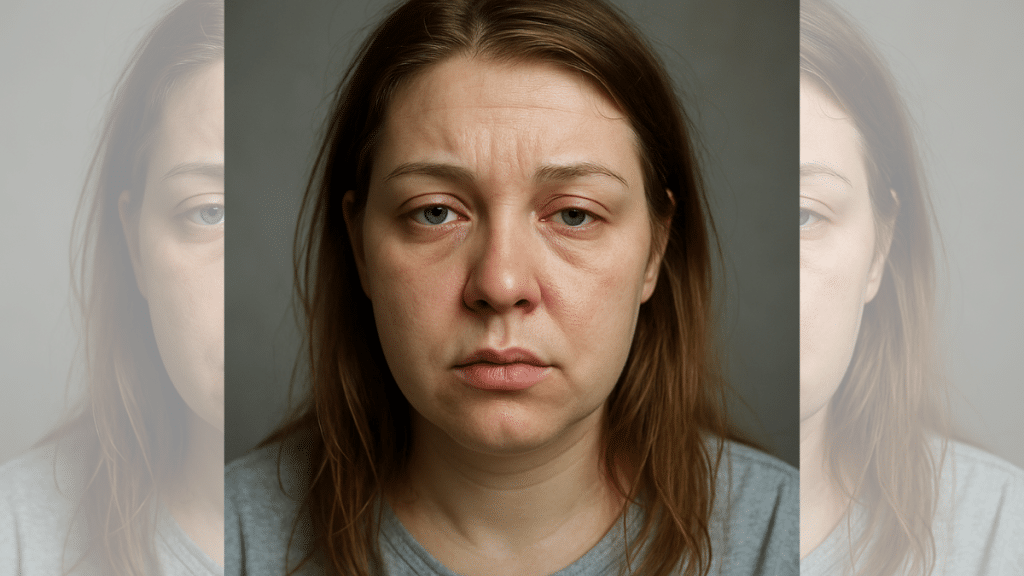Many people have experienced looking in the mirror the morning after an all-nighter and noticing that their face appears puffier and their skin looks duller than usual. While this may seem like a temporary issue caused by fatigue, it is actually the result of a complex interplay between physiological changes in the body, damage to the skin barrier, and dysregulation of fluid balance. This article explores the causes behind facial puffiness and dull skin after sleep deprivation, and explains the connection between skin water loss and edema. It is particularly useful for those interested in treatments that improve hydration and skin elasticity, such as skin boosters.
The Impact of Sleep Deprivation on the Skin
Sleep is a crucial process for physical recovery and regeneration. When we stay up all night or lack sufficient sleep, our body secretes higher levels of cortisol, a stress hormone, and the sympathetic nervous system becomes hyperactive. This results in vasoconstriction and reduced blood flow to the skin, limiting the delivery of oxygen and nutrients to skin cells. Additionally, the moisture content of the stratum corneum—which forms the skin barrier—declines, and transepidermal water loss (TEWL) increases, making the skin more prone to dryness and dullness.
When the skin barrier is weakened, the cohesion between corneocytes becomes loose, allowing water and lipids to escape continuously through those gaps. As a result, the skin becomes rough, loses elasticity, and takes on a dull and lifeless appearance. The face, in particular, is more susceptible to these effects because the skin is thinner and more sensitive to external stimuli than other areas of the body.
Why the Face Swells After Staying Up Late
Facial swelling after staying up all night is primarily caused by the abnormal accumulation of interstitial fluid—edema. Edema occurs when fluid inside the blood vessels leaks into the surrounding tissues. Typically, gravity causes edema to accumulate in the lower limbs. However, when lying down or sitting for extended periods during the night, fluid tends to collect in areas with loose connective tissue, such as the face and the periorbital region.
Furthermore, sleep deprivation and accumulated fatigue increase sympathetic nervous activity, which in turn reduces the kidney’s excretion of sodium and water. As a result, more fluid remains in the body and leaks out into the tissues, leading to facial puffiness. Eating salty food late at night exacerbates this process by altering osmotic balance, drawing more water into the extracellular space and intensifying edema.
The Correlation Between Transepidermal Water Loss and Edema
The stratum corneum of the skin serves as a barrier that retains moisture and protects against external irritants. When this barrier is compromised or when skin moisture levels drop, the skin becomes dry, its defense mechanisms are weakened, and it becomes more sensitive to irritation. As TEWL increases, the skin surface becomes rough, flaky, and dull due to dehydration and decreased elasticity.
Although edema causes temporary swelling and tautness in the skin, it does not equate to healthy hydration. In fact, fluid retained in the interstitial space disrupts normal cellular metabolism and circulation, slowing down skin regeneration. Over time, this impairs the skin barrier and accelerates water loss. In other words, while edematous skin may appear plump on the surface, its intrinsic ability to retain moisture is diminished, ultimately leading to dull, sagging, and less resilient skin.
Summary of Major Causes of Puffy and Dull Skin
- Increased sympathetic activity and cortisol secretion due to sleep deprivation
- Impaired skin barrier function and elevated transepidermal water loss
- Decreased fluid excretion from poor blood circulation and kidney function
- Increased salt intake leading to osmotic imbalance and fluid retention in tissues
- Excess accumulation of fluid in facial tissues leading to edema
How to Manage Dull Skin and Facial Edema
To prevent or alleviate dullness and puffiness after staying up all night, prioritizing regular sleep and adequate rest is key. It is also important to maintain a skincare routine that strengthens the skin barrier and minimizes water loss. Balancing oil and moisture levels, and using non-irritating moisturizers that retain moisture in the stratum corneum can help keep the skin hydrated.
Reducing sodium intake and engaging in light stretching or facial massage can improve blood circulation and promote the drainage of stagnant interstitial fluid. For more targeted improvement of hydration and skin elasticity, treatments such as skin boosters may also be considered.
Quick Recap
• Why does the face swell after staying up all night?
- Fluid accumulates in the loose tissues of the face where the skin is thin
- Sleep deprivation leads to sympathetic overactivity, kidney function declines, and less fluid is excreted
- High sodium intake alters osmotic pressure, drawing more water into the tissues
• Why does the skin become dull?
- Sleep deprivation impairs the skin barrier and increases TEWL
- Lower moisture content in the stratum corneum results in dryness and decreased elasticity
• Relationship between skin water loss and edema
- Edema can create temporary plumpness, but actually hinders skin metabolism and regeneration
- Over time, it weakens barrier function and accelerates water loss
• Management strategies
- Ensure consistent sleep and rest
- Strengthen the skin barrier and maintain hydration
- Reduce sodium intake and promote blood circulation
- Consider aesthetic treatments like skin boosters for hydration and elasticity improvement
As seen above, facial puffiness and skin dullness after a sleepless night are not merely signs of fatigue—they are manifestations of complex changes in skin physiology and systemic fluid regulation. For healthy, elastic skin, it’s essential to manage lifestyle habits while paying attention to skin hydration and edema prevention.
